Maintaining a swimming pool is not just about ensuring a space for leisure and fun; it’s about safeguarding a significant investment in your home and protecting the health and safety of your family and guests. At Nelson Pool Company, we’ve seen firsthand the transformative power of proper pool maintenance and the costly consequences of neglect.
The essence of pool maintenance lies in the regular cleaning and chemical balancing routines and the vigilant monitoring of its overall condition. A well-maintained pool not only guarantees endless hours of enjoyment but also prolongs the life of the pool, ensuring that it remains a valuable asset for years to come. Unfortunately, the need for professional repair is often realized too late, leading to more extensive and expensive fixes.
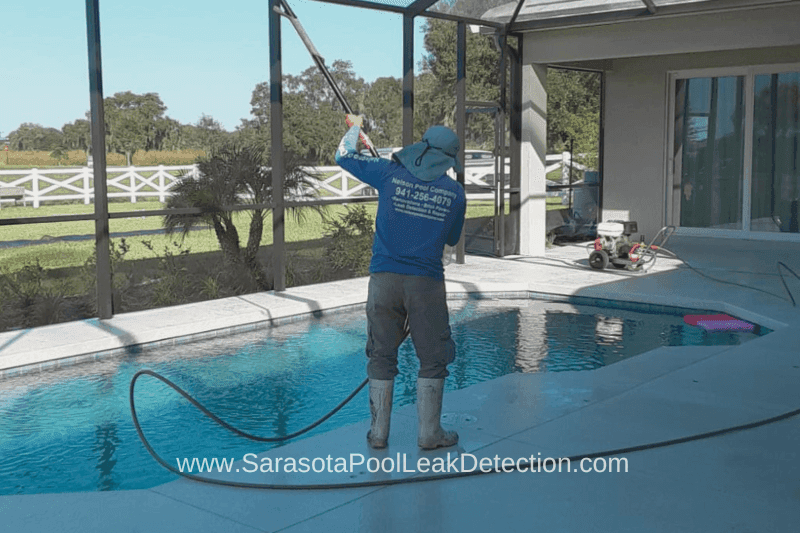
Recognizing the signs that your pool requires professional repair can be a learning curve. It’s not just about looking for apparent cracks or visible damage; sometimes, the symptoms of a pool in distress are subtle and easy to overlook. From fluctuating water levels to unusual noises from the pool equipment, these signs are the pool’s way of communicating that something is wrong.
Understanding when to call in the experts is crucial. While regular maintenance can be handled by most pool owners, specific issues demand the attention of professionals. At Nelson Pool Company, we aim to empower pool owners with the knowledge to identify when it’s time to call for help. By recognizing the early signs of trouble and acting promptly, pool owners can ensure that their pools remain a source of joy and relaxation, not stress and financial strain.
Sign 1: Cracks and Structural Damage
In pool maintenance, the appearance of cracks is often met with immediate concern. Cracks in your pool can be more than just an aesthetic issue; they can signal deeper structural problems that, if ignored, can lead to more significant and costly repairs. Understanding the types of cracks and their implications is crucial in maintaining the longevity and safety of your pool.
Types of Cracks:
Surface Cracks
These are the most common and least worrisome cracks. Often hairline in nature, surface cracks typically affect only the pool’s plaster or finish. They can be caused by various factors, including the natural settling of the ground or temperature changes. These cracks extend through the pool’s concrete shell and can compromise the structure’s integrity. If they begin to widen or lengthen, it’s time to consult a professional.
Structural Cracks
Structural cracks are a more serious concern. These cracks extend through the pool’s concrete shell and can compromise the integrity of the structure. They are often wider than surface cracks and can sometimes be accompanied by leaks. Structural cracks can be caused by ground movement, poor construction, or pressure from water saturation in the surrounding soil. Identifying these cracks is vital in preventing more significant damage.
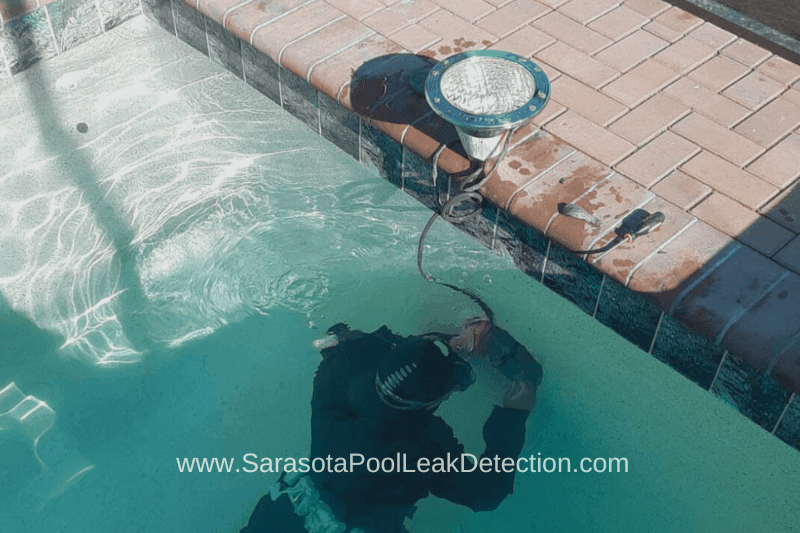
Impact on Safety and Integrity:
The presence of structural cracks can have a profound impact on the safety and integrity of your pool. These cracks can lead to water loss, further destabilizing the surrounding soil and exacerbating the issue. Structural failure can occur in severe cases, leading to a complete pool overhaul.
Expert Advice:
As experienced professionals in pool repair, our advice is straightforward – don’t ignore cracks. While minor repairs may address surface cracks, structural cracks often require more extensive intervention. If you notice a crack growing or leaking or multiple cracks forming, it’s time to call a professional. A skilled technician can assess the severity of the crack and recommend the appropriate course of action, which might range from epoxy injections to complete resurfacing or reconstruction.
Potential Consequences of Ignoring Cracks:
Ignoring cracks, especially structural ones, can lead to many problems. Beyond the obvious safety risks and potential for structural failure, there are financial implications. Minor cracks can be repaired inexpensively, but the damage can escalate if addressed, leading to a much more significant financial burden. Additionally, water loss from leaks can increase your water bill and strain your pool’s Equipment, leading to higher operating costs and potential equipment failure.
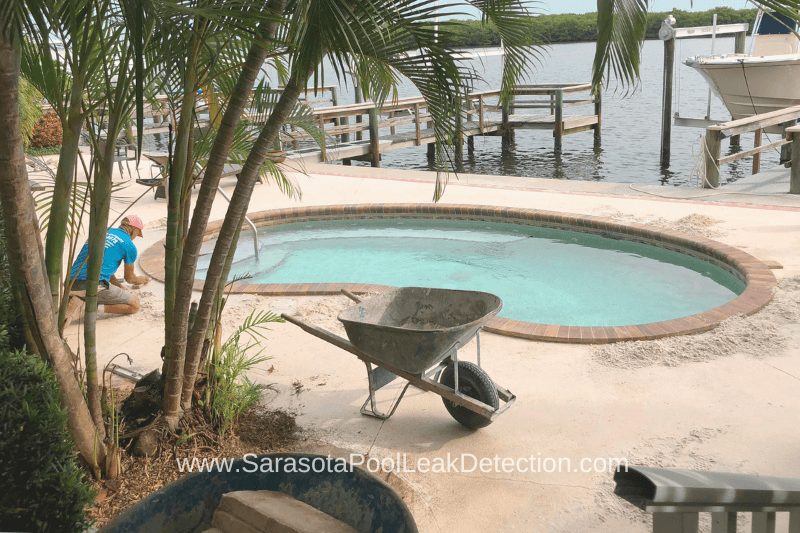
Sign 2: Persistent Leaks
Detecting and addressing leaks in your swimming pool is critical to pool maintenance. A persistent leak leads to water loss and can cause significant damage over time. Understanding how to identify a leak, its dangers, professional detection techniques, and the long-term effects of untreated leaks is essential for any pool owner.
Identifying a Leak in Your Pool:
Leak detection in a pool can be tricky as water loss can occur due to evaporation or splash-out. However, some telltale signs suggest a leak:
Unusual Water Loss: Adding more water than usual to maintain the pool’s level could be a sign of a leak.
Wet Spots Around the Pool: Persistent wet spots or eroded areas around the pool can indicate a leak in the pool’s plumbing.
Altered Chemical Balance: Frequent changes in water chemistry might indicate that fresh water is constantly added to replace lost water.
Cracks or Falling Tile: These structural changes can be both a cause and a symptom of a leak.
Dangers of Water Loss Beyond Normal Evaporation:
Water loss in a pool that goes beyond average evaporation rates poses several dangers:
Structural Damage: Continuous water leakage can weaken the structural integrity of the pool and the surrounding area.
Increased Costs: Frequent water refills and chemical rebalancing increase operational costs.
Environmental Impact: Excessive water usage hurts the environment.
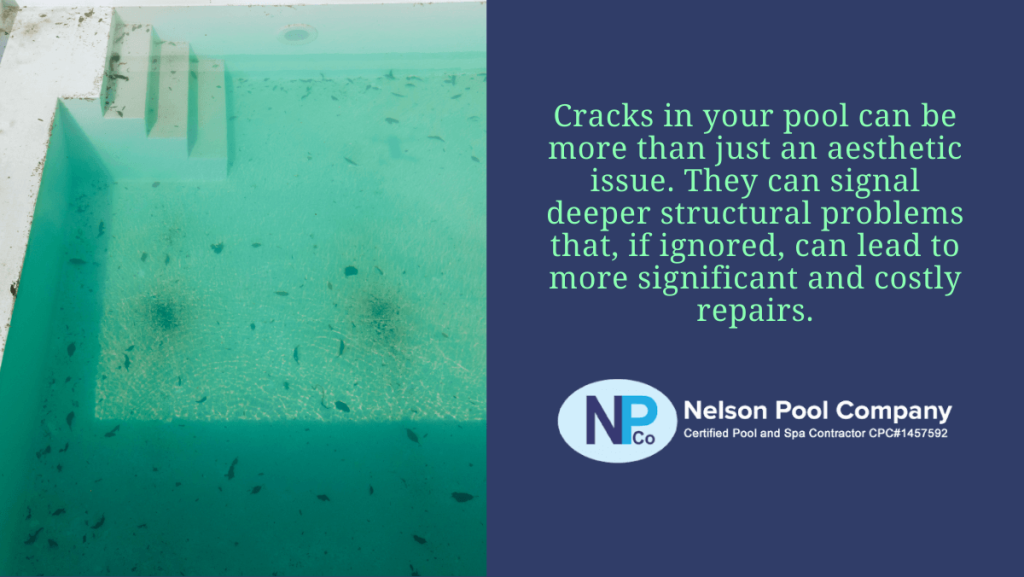
Professional Leak Detection Techniques:
Professionals employ a variety of methods to detect and locate leaks:
Pressure Testing: This involves isolating sections of the pool plumbing and applying pressure to see if it holds.
Dye Testing: In this method, dye is used near suspected leak points to observe if the dye is drawn out, indicating a leak.
Electronic Leak Detection: Advanced technology is used to detect changes in the electrical field around the pool, pinpointing the leak location.
Repairing Leaks:
Once a leak is detected, professionals assess the best method to repair it. Depending on the leak’s location and severity, this could range from simple patchwork to more extensive plumbing repairs.
Long-term Effects of Untreated Leaks:
Ignoring a leak can lead to several long-term problems:
Severe Structural Damage: Over time, persistent leaks can undermine the pool’s foundation, leading to significant structural failures.
Landscaping Damage: Excess water can damage the surrounding landscape, erode soil, and harm plant life.
High Repair Costs: The longer a leak is left unaddressed, the more expensive the repair can become.
Increased Utility Bills: Continuous water and chemical loss increase operational costs.
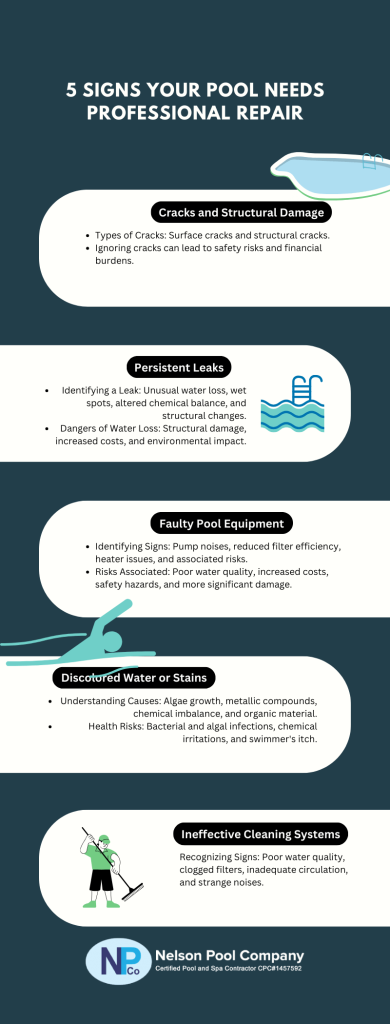
Sign 3: Faulty Pool Equipment
Proper pool equipment functioning is essential for maintaining a clean, safe, and enjoyable swimming environment. When Equipment like pumps, filters, and heaters start to fail, it compromises the quality of your pool. It can lead to larger, more expensive problems. Understanding how to identify failing equipment, the risks associated with malfunctioning components, the need for professional diagnostics and repair, and maintenance tips are crucial for any pool owner.
Identifying Signs of Failing Equipment:
Pumps:
At the heart of your pool’s circulation system, a failing pump may exhibit unusual noises, reduced water flow, or intermittent stopping and starting. Leaking water around the pump or visible damage to the pump housing also indicates problems.
Filters:
Filters that need attention might show reduced efficiency in cleaning the water, leading to cloudiness or debris in the pool. A pressure gauge reading that is consistently too high or too low can also indicate an issue.
Heaters:
Common signs of heater trouble include failure to reach the set temperature, turning off before heating the pool adequately, or showing error codes. Physical signs like soot or rust around the heater can also indicate problems.
Risks Associated with Malfunctioning Equipment:
Ignoring faulty pool equipment can lead to a range of risks:
Poor Water Quality: Inadequate filtration or circulation can lead to algae growth, bacteria proliferation, and poor water quality.
Increased Costs: Faulty equipment often runs less efficiently, consuming more energy and leading to higher utility bills.
Safety Hazards: Equipment like heaters can become a safety hazard if not functioning correctly, potentially leading to accidents or injuries.
More significant Damage: Small issues can escalate into major repairs if not addressed promptly, often resulting in more downtime and higher costs.
The Importance of Professional Diagnostics and Repair:
When it comes to diagnosing and repairing pool equipment, relying on professionals is critical:
Expertise: Professionals have the necessary expertise and tools to diagnose and repair complex pool equipment accurately.
Warranty Preservation: DIY repairs can often void warranties. Professional servicing ensures that your equipment’s warranty remains intact.
Safety: Handling pool equipment repairs can be risky. Professionals know how to safely manage these risks.
Longevity of Equipment: Properly executed repairs can extend the life of your pool equipment.
Tips for Maintaining Pool Equipment to Prevent Issues:
Regular maintenance can prevent many standard equipment issues:
Regular Cleaning: Keep skimmer baskets, pump baskets, and filters clean to ensure optimal operation.
Check and Balance Water Chemistry: Proper water chemistry can prevent corrosion and scaling in equipment.
Inspect Regularly: Regular visual inspections can help catch issues before they become serious problems.
Seasonal Servicing: Have a professional service your equipment at least once a year, particularly before heavy usage seasons.
Listen for Unusual Noises: Sounds like grinding, screeching, or banging from equipment can be early signs of trouble.
Monitor Performance: Keep an eye on water clarity and temperature. Changes can indicate equipment issues.
Sign 4: Discolored Water or Stains
Discolored water or stains in a pool are not just unsightly; they can be indicators of underlying issues that may affect the pool’s health and the safety of its users. Understanding the causes of these problems, the health risks they pose, professional approaches to restoration, and preventive measures are crucial for maintaining a pristine pool.
Understanding Causes of Discoloration and Staining:
Discoloration and staining in pools can arise from several sources:
Algae Growth: Green, yellow, or black discoloration often indicates algae growth, which can flourish due to inadequate chlorination or filtration.
Metallic Compounds: Metals in the water, like iron, copper, and manganese, can cause stains ranging from green to brown to black.
Chemical Imbalance: Imbalances in pH, chlorine, or other chemicals can lead to cloudy or discolored water.
Organic Material: Leaves, dirt, and other organic materials can stain pool surfaces and discolor water.
Health Risks Associated with Poor Water Quality:
Poor water quality can pose several health risks:
Bacterial and Algal Infections: Algae and bacteria in pool water can cause skin, ear, respiratory, and eye infections.
Chemical Irritations: Imbalanced chemicals can lead to skin and eye irritations.
Swimmer’s Itch: Caused by parasites in water, this condition leads to uncomfortable skin rashes.
Professional Approaches to Restoring Water Balance and Clarity:
Professionals employ a variety of methods to restore pool water:
Chemical Adjustments: Balancing pH levels, chlorine, and other chemicals to correct water color and clarity.
Shock Treatments: High levels of chlorine or non-chlorine shocks can eliminate algae and bacteria.
Filtration and Circulation Adjustments: Improving water circulation and filtration to remove debris and contaminants.
Stain Removal: Using specific chemicals or methods like acid washing to remove stains from pool surfaces.
Preventive Measures to Keep Water Clean and Clear:
Regular maintenance is critical to preventing water discoloration and stains:
Regular Testing: Test water chemistry regularly and adjust to maintain proper balance.
Routine Cleaning: Regularly clean the pool and filters to remove debris and contaminants.
Proper Circulation: Ensure the pool’s circulation system works efficiently to distribute chemicals and filter water.
Prevent Metal Contamination: Use a metal sequestrant if your water source is high in metals.
Adequate Chlorination: Maintain proper chlorine levels to prevent algae and bacteria growth.
Seasonal Preparation: Properly opening and closing your pool for the season can prevent many issues.
Sign 5: Ineffective Cleaning Systems
A pool’s cleaning system is vital for maintaining the hygiene and overall quality of the swimming experience. However, like any other component, it can become less effective over time. Recognizing the signs of an ineffective cleaning system, understanding its impact on pool hygiene and user experience, exploring professional solutions, and adhering to maintenance tips are essential to ensure a clean and safe pool environment.
Recognizing When Your Cleaning System Isn’t Working Properly:
An ineffective cleaning system often exhibits clear signs:
Poor Water Quality: Cloudy water, persistent algae growth, or debris that doesn’t seem to disappear are indicators of a failing system.
Clogged or Dirty Filters: If filters clog more frequently or don’t seem to be trapping debris as they should, it’s a sign they might be malfunctioning.
Inadequate Circulation: Water that doesn’t circulate properly, evidenced by stagnant areas or poor distribution of chemicals, suggests a problem.
Strange Noises or Operations: Unusual sounds from the pump or erratic movements from automatic cleaners can indicate issues.
Impact on Pool Hygiene and User Experience:
An ineffective cleaning system can significantly degrade the pool environment:
Health Risks: Poor hygiene due to inadequate cleaning can lead to bacterial and algae growth, increasing the risk of infections and illnesses.
Unpleasant Swimming Conditions: Debris, cloudy water, and chemical imbalances can make the swimming experience unenjoyable and even hazardous.
Aesthetic Appeal: A dirty pool could be more appealing and can discourage use.
Professional Solutions for Upgrading or Repairing Cleaning Systems:
When a cleaning system is not functioning correctly, professional intervention is often necessary:
Diagnostic Services: A professional can accurately diagnose issues with the system, from pump problems to filtration inefficiencies.
Upgrades and Repairs: Based on the diagnosis, a professional can repair existing equipment or suggest upgrades for better performance.
Customized Solutions: Professionals can tailor solutions based on the pool’s specific needs and usage patterns.
Maintenance Tips for Cleaning Systems:
Regular maintenance can prolong the life and efficiency of your pool’s cleaning system:
Regular Cleaning of Filters: Clean and replace filters as recommended to ensure they function effectively.
Monitor and Adjust Chemical Levels: Proper chemical balance aids in keeping the pool clean and reduces strain on the cleaning system.
Inspect Equipment Regularly: Regular checks for wear and tear can catch potential problems early.
Keep Skimmers Clear: Regularly empty and clean skimmer baskets to improve the efficiency of the filtration system.
Seasonal Checks: Perform comprehensive checks and maintenance as seasons change, particularly in spring and fall.
To ensure the longevity and safety of your pool, be vigilant for key signs indicating the need for professional repair: structural cracks, persistent leaks, malfunctioning equipment, water discoloration, and ineffective cleaning systems. Regular inspections and maintenance are essential in preserving your pool’s beauty and functionality. Professional expertise is invaluable for accurate problem diagnosis and effective, lasting repairs. For more detailed information and helpful tips, visit our blog section, where you’ll find extensive pool care and maintenance resources.
Need professional assistance? Call (561) 570-1269 now, and we will schedule a top-rated pool repair and renovation company in your area to contact you. They will arrange a convenient time to visit and provide a bid for the necessary repairs. Alternatively, you can fill out this form, and we will ensure the best pool renovation company in your area contacts you. Trust in professional care for a pristine and enjoyable pool experience.
